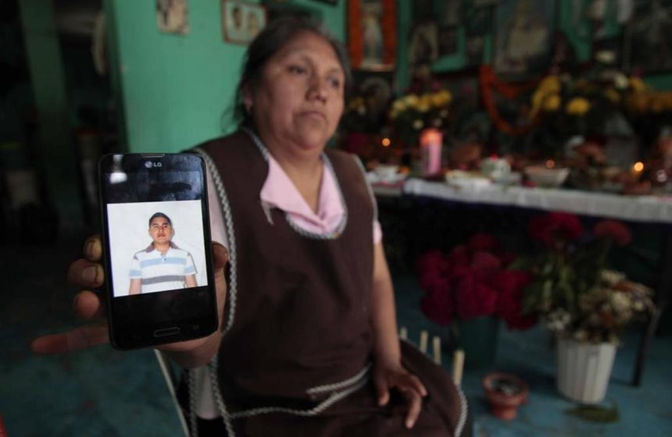My son is a poor farmer, just like me. He always came out here with me to the farm to plant seeds and harvest the crops. He came here to plant and work the farm in the fresh air his whole life.
When I come here, since they took him away, I listen to the silence and the wind in the trees, rustling the leaves and I think about him. I can almost feel his presence here with me and I can’t think of anything else… only that he is not here with me. Its a strong feeling of loss that he’s not here and it hurts powerfully.
- Rafael López Catarino
Rafael López often heads to the place where he and his son teamed for a lifetime: the plot they planted and harvested for many years. The family plot of little more than acre is located about a 1/3 mile from the home where Julio César grew up with his three siblings, cousins, parents and grandparents. On the plot there are rows sown with velvet flower, coriander, lettuce, cabbage, corn, and jicama. From that plot Julio César listened to the war band of the Ayotzinapa Rural Teachers’ College and was then a child who dreamed of being a rural teacher: "One day I will be in that war band.” At that time, Rafael's son played the cornet and was part of his elementary school band. Later, when he continued his education he also joined the high school band.
The López Patolzin family is from the El Santuario neighborhood of Tixtla. As a child, Julio César liked soccer and basketball, band music, playing the bugle and helping his father and grandfather Candido in their land next to the Normal Rural. He was a strong, healthy and playful child, the most naughty of all the children.
Julio César desired for a better future and wanted to study at the Rural Normal Raúl Isidro Burgos. It took him three tries to realize his dream. Between each attempt he learned different trades: he was a blacksmith's assistant, a dump truck driver, a full-time farmer and was also part of the Mexican Army for two years, leaving after he suffered an injury during rescue work in 2013, when hurricanes Manuel and Ingrid devastated his hometown. With one of his first salaries he bought a pair of shoes for his father.
When Julio César informed his father that he wanted to study in the Normal Rural in Ayotzinapa, he did not object. Julio César was the only one in the family who expressed a desire to study a profession, and Don Rafael wanted a better life for his son.
In August of 2014, Julio César was on the other side of his father's plot, working the lands of Ayotzinapa as part of the admission test. For a time father and son conversed through the fence that divides the school lands from the plots of the peasants. Don Rafael came with some tacos wrapped in napkins embroidered by Julio César’s grandmother. He was thin and a bit emaciated, but animated because he was finally selected as a first-year student.
After their son was forcibly disappeared on September 26, 2014, Don Rafael and his wife Joaquina Patolzin de la Cruz, Julio César’s brother Gustavo and cousin Mario, along with relatives and neighbors went to the hills around Iguala to look for him. They started at seven in the morning and ended at 11 at night for two consecutive months.
Neither the love the family has for Julio César or the tears they have shed since he has disappeared can be measured. The disappearance of the 43 normalistas of Ayotzinapa destroyed entire families. In Tixtla, Guerrero, where 15 of them are from, their absence is suffered in the soul of everyone who loves them.

















